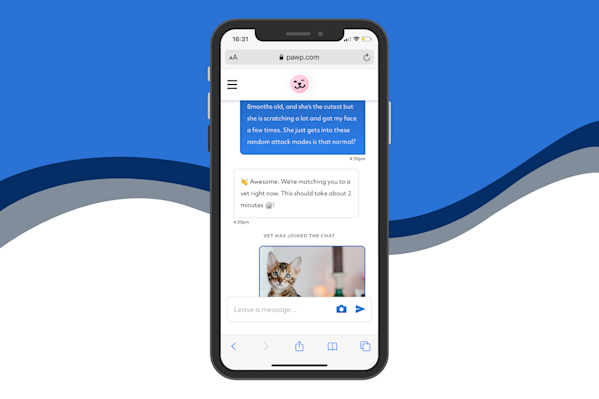Whether you're a new pet parent or someone who's had dogs, cats (or both), all their lives, you're bound to have questions. And while you may approach your primary vet for big medical decisions, where do you go when you just need some general vet advice? Searching for answers to your pet problems can be time-consuming and anxiety-inducing. That's why we've introduced the Pawp Clinic, a 24/7 online vet service that also provides up to $3,000 in pet emergency protection (for more than one pet).
So if you're worried about your pet during an emergency or if you just have a silly question, Pawp online vets are trained to help. Each week our virtual veterinarians answer the most interesting questions about dogs and cats they've received this week — providing you with helpful, researched information and also letting you know the kinds of questions you can ask on Pawp's online vet platform. You can also check out last week's Ask A Vet.
Ask Pawp's Online Vets Anything
My dog has diarrhea. Why? How do I treat it?
Dog diarrhea is a common symptom of a few different causes — including dietary changes, ingesting a toxic substance, food allergies, kidney/liver disease, and parasites. Some of the reasons your dog is having diarrhea are normal and others are cause for alarm. If your dog has other health problems or is a puppy or senior, you should play it safe and talk to a vet. If your dog experiences a few bouts but otherwise seems fine, you can monitor the situation while providing plenty of fluids and serving bland meals. If at any point you are concerned, it's always best to talk to a professional — online vets make it easy.
Read More: Dog Diarrhea: Why Does My Dog Have It? How Do I Stop It?
I love my dog but not his breath! How do I make my dog's breath smell better?
There's nothing better than an adoring pet, but sometimes that adoration can... come at a cost. Most "doggy breath" is the result of periodontal disease, which most pets will have some form of by the age of 3. A good dental health routine can actually add years to your dog's life AND make his affection more welcome. Although you can't cure periodontal disease, you can go for regular dental cleanings, consistently brush your pet's teeth (with pet-friendly toothpaste), switch to dental health-specific food diets, and give your dog dental chews or treats.
Read More: Why Good Dental Health Gives Pets Longer, Healthier Lives
Does my dog really need to take a heartworm preventative?
The unfortunate truth about heartworms is that it is very easy to prevent your dog from getting them and very hard (and expensive!) to cure. Heartworms have been found in all 50 states and are transmitted by mosquito bite — meaning you won't know your dog is infected until much later when the parasites have burrowed in your dog's heart and lungs and you start to see the symptoms. Heartworm preventatives come in tablets, topicals, and injections. Keeping your dog protected now could not only save their life, but save you thousands in the future.
Read More: How Do I Know If My Dog Has Parasites?
Why does my cat have dry, flaky skin. How can I help her?
Cat dandruff is common, but its causes are varied. Your cat could be lacking nutrients in her diet, having an allergic reaction (environmental or food), a parasite infection, or just some dry winter skin. Before you treat your cat's dry skin, you need to determine the cause. The fastest way to figure it out is by talking to a vet. If you want to try a few safe treatments in the meantime at home, they may also help you determine the dandruff cause: Give your cat a brush (and maybe a bath); get a humidifier; change your cat's diet (slowly).
Read More: Cat Dandruff? Why Your Cat Has Dry Skin & How To Treat It
Can I use essential oils on my cats?
Essential oils have grown in popularity along with the rise of holistic cures for common ailments. These oils are extracted from plants and are used in everything from aromatherapy to treating bacterial skin infections. There's very little medical research on the wellness benefits, so before applying essential oils on your pet (topically and NEVER to ingest), you should absolutely talk to a veterinarian. There are quite a few oils that are considered toxic for cats, including: tea tree, eucalyptus, citrus, peppermint, to name a few. If you are concerned about your pet's reaction to essential oils, talk to a vet or poison control hotline immediately.
Read More: Do Essential Oils Work On Pets? Are They Safe?
My cat is now a senior, should I switch him to senior-specific food?
Yes! Pets of different ages will have different needs and senior-specific diets are specially formulated to make sure your cat is getting exactly the nutrients he needs (in the right amount) to age, happy and healthy. You can extend your cat's life by honing in on medical issues specific to him and other seniors — like kidney disease. Many cats have kidney problems as they age and getting in front of those is always a good idea, which is also a good time to tell you to make sure he's drinking enough water. As a cat ages, if he's not already on wet food, it can help with hydration.
Read More: Senior Cat: 6 Ways To Make Your Aging Cat's Life Better
